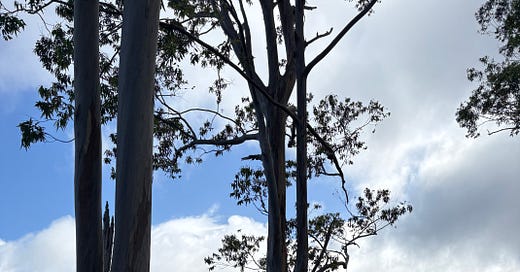In my childhood memory, we spent the afternoon of Good Friday in silence. Lights off, no television, radio, or CDs—a fast of sorts, reminding us that this was no typical Friday afternoon. Whether it was truly that stark or perhaps just a one-year experiment of my mom's, I don't know, but Good Friday is etched in my brain as meaningful, quiet, and thoughtful.
I always looked forward to this pause.
Resurrection Sunday vibrates with a similar frequency in my memory. The new outfit I wore the year we spent Easter in Chicago still holds a place in my mind as the best outfit I ever owned—knee socks and a matching jacket included. Easter was as bright and loud and celebratory as Good Friday was hushed.
On the Saturday in between, I vaguely remember that we would weed the flower beds, bike the neighborhood, and clean the garage. We chopped ingredients for Sunday's brunch. I remembered the Stations of the Cross from the Thursday or Friday just before, and I ironed my clothes for the day after — but Saturday was a nothing-burger. It wasn't even a day that I remember to be marked for waiting. It just was … there — a placeholder on the calendar, another humdrum day.
As I approach Holy Week this year, I find it ironic that I have no meaningful childhood memories of the place I seemed to have most often found myself in my circumstances: Holy Hard Saturday.
If you read last month's letter, you know that we've moved out of our home, so major mold remediation can be undertaken inside the place we love. As the project has stretched beyond what we expected (the mold is much more widespread than we knew), we've had the gift of a forced sabbatical of sorts— one in which we would not merely endure the hardships but observe them (and heal from them) in a profoundly beautiful place.
And it's here in this place — before the project has even come close to an end date, in yet another iteration of Saturday-waiting — that I am finding Saturday (again) to be holy and not just hard.
I remember a night about six or seven years ago when I circled up with friends in my family room as we started a small group that would last for years and said, "I want to be someone who laughs at the days ahead." Hope was alluring to me. Attractive. Buoyant. Anti-aging, even.
But also fragile.
And then there is my youthful interpretation, that hope felt like gripping the sides of a rollercoaster. Sure, the ride would end, and I'd still have a heartbeat, but thrilling in a way because what if it didn't or I didn't? Hope was for the dreamers and the zealots. It was an orientation—some had it, some didn't.
But even through this blurry and unclear interpretation, I still wanted it. I wanted to be one who laughed at the days ahead, then, too. Hope is very becoming, after all.
Little did I know that the immediate years that followed that night of declaration to my friends would give me every reason to believe hope was only for the 30-and-unders who hadn't yet lost in life. (To be clear, I wasn’t one of them.)
I've stayed there for a while, unsure of what I think of hope, yet still consistently observing what scripture says about it and curious. Watchful.
I find myself, this Holy Week, aware that at some moment between then and now, I have traveled a distance — and there are early inklings of fresh hope (a strong hope) inside of me. Yes, even with a house torn down to the studs in some areas, expenses we never expected or imagined, friends 4,000 miles away, additional and even greater life-loss beyond our house, and a hazy future … hope is losing its fragility.
I said it: Hope is losing its fragility.
What an unlikely story — hope gets birthed in the dark before the dawn.
So I suppose this is a short note for you, the one who is finding yourself crushed by the cross of your life (you are intimately acquainted with Good Friday), aware of the resurrection, and yet chopping onions on holy Saturday and wondering if you'll ever laugh at the days ahead:
The promise of God for us is "…suffering produces endurance, and endurance produces character, and character produces hope, and hope does not put us to shame, because God's love has been poured into our hearts through the Holy Spirit who has been given to us" (Romans 5:3-5).
God's intangible work is often most potent just before dawn—in the darkness between death and life.
We saw it on the cross, and we have the invitation to live it in our lives. Paul assures us in Romans that this is what suffering produces. And I am living it in my life — this holy, other hope.
From my own nascent understanding of this hope, that feels ephemeral but so so weighty still, might I encourage you:
this Saturday (however long your Saturday has been) is productive.
Wildly productive.
Until next month,
Sara





"hope gets birthed in the dark before the dawn." Sara!!! There is just so beautiful much to those words--so much.
I have called the Saturday between--silent Saturday. And how hard for it to have been the Sabbath, and for them to have not been able to "do"through the midst of that cacophonous silence.
Oh Sara! The waiting… the in between … the stillness. I think that’s harder for me than even the dying part. And I’m here right now. Again. So this was a very hopeful post for me. Thank you!